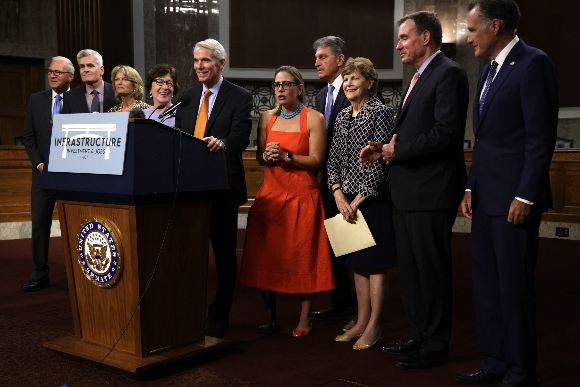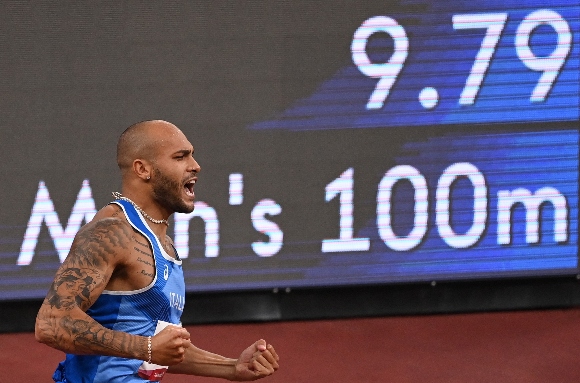The Hill’s Morning Report – Presented by Facebook – Senate finalizes $1.2 trillion bipartisan infrastructure bill
Presented by Facebook

Welcome to The Hill’s Morning Report. It is Monday! Welcome to August! We get you up to speed on the most important developments in politics and policy, plus trends to watch. Alexis Simendinger and Al Weaver are the co-creators. Readers can find us on Twitter @asimendinger and @alweaver22. Please recommend the Morning Report to friends and let us know what you think. CLICK HERE to subscribe!
Total U.S. coronavirus deaths reported each morning this week: Monday, 613,228.
As of this morning, 57.7 percent of the U.S. population has received at least one dose of a COVID-19 vaccine and 54.2 percent is fully vaccinated, according to the Bloomberg News global vaccine tracker.
Infrastructure week has truly arrived.
Senate negotiators on Sunday night unveiled the long-awaited $1.2 trillion bipartisan infrastructure legislation, teeing up the Senate to pass the bill by the end of the week after lawmakers burned the midnight oil to finalize an agreement in recent days (The Hill).
Senators unveiled the 2,702-page infrastructure bill on Sunday night after working throughout the weekend to finalize the package that has been the subject of intense negotiations for months. Senate Majority Leader Charles Schumer (D-N.Y.) officially brought the package up for consideration, with lawmakers likely to offer amendments in the coming days before the bill reaches the floor for a final vote by the end of the week.
“We are proud this evening to announce this legislation and we look forward very much to working with our colleagues in a collaborative and open way over the coming days to work through this historic investment in infrastructure,” said Sen. Kyrsten Sinema (D-Ariz.), the top Democratic negotiator, said from the Senate floor with the other members of the group.
The legislation, titled the “Bipartisan Infrastructure Investment and Jobs Act,” costs an estimated $1.2 trillion over eight years and includes only $550 billion in new spending, down from $570 billion in previous iterations. According to the White House, the figure represents the largest investment ever by the federal government in public transit and the largest investment ever in clean drinking water and waste water.
The inches-thick bill also represents a key part of President Biden’s agenda and would fund improvements to the nation’s roads, bridges, ports and broadband connections. Negotiators appeared en masse on the Senate floor after emerging from dotting the i’s and crossing the t’s on the package to laud the bipartisan talks that led them to where they are now.
“I’ve seen sausage made, and it’s a prettier process and a lot easier,” Sen. Mitt Romney (R-Utah), one member of the group of 10 senators involved in crafting the proposal, said on the Senate floor on Sunday night. “But this is more rewarding.”
The Associated Press: It’s in — and big: Senators produce $1 trillion infrastructure bill.
The Washington Post: Senate finishing crafting $1 trillion bipartisan infrastructure proposal, setting delicate debate in motion.
READ: The $1.2 trillion Infrastructure Investment and Jobs Act.
Earlier on Sunday, Sens. Susan Collins (R-Maine) and Joe Manchin (D-W.Va.) projected optimism that a bill would finally be produced by the end of the day after hemming and hawing plagued the bill’s introduction in recent weeks (The Hill).
“When you see Chuck Schumer and [Senate Minority Leader Mitch McConnell (R-Ky.)] voting for the same thing, it’s unbelievable,” Manchin told CNN’s “State of the Union.”
According to The Hill’s Jordain Carney, among the final items to be resolved before putting pen to paper in the form of legislative text was a last-minute hiccup on broadband, which negotiators say didn’t get resolved until Friday, forcing lawmakers into the rare Sunday session to finish their work.
The Washington Post: The quiet Biden-GOP talks behind the infrastructure deal.
The Hill: Schumer: Democrats “on track” to pass bipartisan deal, $3.5 trillion budget.
Carl Hulse, The New York Times: Why trust is in short supply on Capitol Hill.
The Hill: Manchin “can’t imagine” supporting change to filibuster for voting rights.
The Hill: Missed debt ceiling deadline kicks off high-stakes fight.

> Evictions: Progressives over the weekend railed against members of their own party after the national eviction moratorium expired at midnight on Saturday and the House failed to garner enough support to extend it before the August recess.
Rep. Alexandria Ocasio-Cortez (D-N.Y.) told CNN’s Jake Tapper on Sunday that she cannot “in good faith blame the Republican Party” for allowing the moratorium to lapse, saying that Democrats had the chance to do something on Friday, but could not garner enough support despite serving in the majority.
“The House and House leadership had the opportunity to vote to extend the moratorium, and there were many, and there was, frankly, a handful of conservative Democrats in the House that threatened to get on planes rather than hold this vote,” Ocasio-Cortez told “State of the Union” when asked who is to blame. “And we have to really just call a spade a spade.”
Speaker Nancy Pelosi (D-Calif.) argued hours later that the Centers for Disease Control and Prevention (CDC) has the ability to extend it even though the Supreme Court ruled that congressional action would be necessary. Later on Sunday, House Democratic leaders called on the White House to take action even though the administration only days ago called on Congress to do just that.
On Friday night, Reps. Cori Bush (D-Mo.), Ilhan Omar (D-Minn.) and Ayanna Pressley (D-Mass.) slept on the Capitol steps to protest members deciding to break for the month long recess without taking action on the issue (The Hill).
The Hill: White House adviser asks landlords to seek rental assistance before evicting tenants.
The Wall Street Journal: Eviction ban’s expiration leaves renters in South appearing most vulnerable.

> Uproar: House Minority Leader Kevin McCarthy (R-Calif.) came under heavy criticism from Democratic lawmakers on Sunday after he joked at a fundraiser in Tennessee over the weekend that it would be hard for him not to hit Pelosi with a gavel if the GOP wins retakes control of the lower chamber in the 2022 midterm elections.
McCarthy made the comment after he was presented with an oversized gavel with the words “Fire Pelosi” on it.
“It will be hard not to hit her with it but I will bang it down,” McCarthy reportedly joked (The Hill).
A number of House Democrats promptly called on McCarthy to apologize for the comment. A McCarthy spokesperson said on Sunday that the GOP leader was “obviously joking.”
A MESSAGE FROM FACEBOOK
The internet has changed a lot since 1996 – internet regulations should too
It’s been 25 years since comprehensive internet regulations passed. See why we support updated regulations on key issues, including:
– Protecting people’s privacy
– Enabling safe and easy data portability between platforms
– Preventing election interference
– Reforming Section 230
LEADING THE DAY
CORONAVIRUS: Anthony Fauci, the head of the National Institute of Allergy and Infectious Diseases, predicted on Sunday that “things are going to get worse” for the U.S. in the immediate future and that more “pain and suffering” will likely take place as the delta variant continues to sweep the country (The Hill).
Fauci made the comments to ABC’s “This Week” when pressed on if the U.S. will have to revert to lockdowns that swept the nation last year and over the winter. The White House chief medical adviser told host Jonathan Karl that he does not expect lockdowns to return, citing the vaccination progress (The Hill).
“We’re looking not, I believe, to lockdown, but we’re looking to some pain and suffering in the future because we’re seeing the number of cases go up,” Fauci said before reiterating for the umpteenth time that the solution is for individuals to get vaccinated.
Thankfully, more Americans are taking those warnings to heart. According to Bloomberg News’s vaccine tracker, more than 700,000 people have received COVID-19 shots over the past five days, marking the first time that total has been eclipsed over that period of time in more than a month (June 27 through July 1).
Of the 816,000 who received jabs on Sunday, 517,000 received their first shot. White House chief of staff Ron Klain tweeted that the past week has been the “strongest week of vaccinations” as far as administering first-time shots.
The Washington Post: When will the summer coronavirus surge peak? It will get worse before it gets better, experts predict.
Sunday Shows: Delta variant, infrastructure dominate.
The Hill: National Institutes of Health (NIH) Director Francis Collins: Mask guidance is “mostly about protecting the unvaccinated.”
The Wall Street Journal: Food and Drug Administration under pressure to grant full approval to COVID-19 vaccines.
> Dept. of for Me, but Not Thee: Days after reinstituting a district wide indoor mask mandate for all regardless of vaccinated status, Washington D.C., Mayor Muriel Bowser (D) was pictured on Saturday maskless while indoors at a wedding reception that featured hundreds of guests who were also unmasked.
The Washington Examiner reported late Saturday that Bowser did not don a mask during the reception while not actively eating or drinking and included a picture showing as much. The wedding ceremony — which Bowser officiated — took place on the rooftop of The Line hotel in Adams Morgan, with the reception taking place indoors. Hours before the mask mandate went into effect, Bowser was photographed maskless alongside comedian Dave Chappelle on Friday night. Chappelle was headlining a comedy show at The Anthem.
In a statement to Fox 5, Bowser’s office maintained that she wore a mask while indoors in compliance with the mandate.

Bowser’s reintroduction of the sweeping mask mandate came on the heels of guidance released only days earlier by the CDC, which has spurred confusion in the U.S.’s battle against the delta variant. As The Hill’s Peter Sullivan notes, while GOP lawmakers and public health experts have fallen on opposite sides of the debate, other top voices have had more nuanced critiques.
Specifically, they have argued that vaccination should be where attention is focused and that masking is only a temporary solution at best or that the CDC did itself no favors in how it communicated the masking change.
Justine Coleman, The Hill: Delta variant raises fears of worsening mutations.
Axios: The double-sided risk of bad vaccine communication.
The Hill: South Carolina Gov. Henry McMaster (R) accuses health experts of “hyperbole.”
The Hill: Florida breaks COVID-19 hospitalization record with more than 10,200 patients.
IN FOCUS/SHARP TAKES
POLITICS: Lawmakers and voting rights advocates are becoming increasingly concerned that election workers could leave their posts en masse in coming election cycles following a 2020 presidential contest that saw a precipitous uptick in violent threats against election administrators.
According to an April survey by the Brennan Center for Justice, 1 in 6 local election workers received threats of violence, with almost 1 in 3 saying they feel unsafe because of their job. Though no central database exists to track departures among the nation’s estimated 8,000 local election workers, one expert said that there is now a “perfect storm of low morale and high turnover.”
“The data are hard to come by, but anyone who has been around elections for a while will tell you that the number of election administrators leaving their jobs this year is much higher than ever,” said Matthew Weil, director of the Elections Project at the Bipartisan Policy Center.
As The Hill’s John Kruzel writes, the raft of new state laws taking aim at access to the ballot box is also expected to be an accelerant of the departure of experienced election workers. The fear comes as the Department of Justice launched a task force aimed at combating violent threats against election workers following a spike in those incidents stemming from the 2020 election (The Hill).
Reid Wilson, The Hill: New spotlight on secretaries of state as electoral battlegrounds.
Alexander Vindman for The Atlantic: What I heard in the White House basement.
> 2022: Billionaire tech entrepreneur Peter Thiel is making his presence felt in two key Senate races and other contests across the country with his checkbook, establishing a reputation in GOP circles as a financial force.
As The Hill’s Tal Axelrod notes, the venture capitalist made waves with a pair of $10 million donations to super PACs supporting “Hillbilly Elegy” author J.D. Vance in the Ohio Senate race and Blake Masters, a Thiel Foundation executive, in the race to unseat Sen. Mark Kelly (D-Ariz.). Thiel, known as the co-founder of PayPal and an early investor in Facebook, is also expected to hand out donations for candidates in House and gubernatorial contests.
The investments are early signals that Thiel (pictured below) intends to use his financial largesse to disseminate his avowed libertarian stances. And the size of the two donations to Vance and Masters — believed to be the single largest donations to any outside groups supporting Senate candidates in history — suggest he’ll be among the biggest players in the 2022 midterms.
The Hill: Up next in the culture wars: Adding women to the draft.
Washingtonian: “The Trumpies: Where are they now?”

*****
ADMINISTRATION: Vice President Harris’s push to address the root causes of immigration is facing serious headwinds before it takes off, as the Mexican government and others in Central America have split with the Biden administration on key policy issues.
As The Hill’s Rafael Bernal and Rebecca Beitsch write, the U.S.’s two closest partners in the region — Mexico and Guatemala — have dealt public blows to one of the vice president’s key portfolio projects. On Tuesday, the U.S. was forced to curb cooperation with Guatemala’s attorney general after the firing of Juan Francisco Sandoval, an anti-corruption prosecutor. The move took place shortly after Harris made corruption a main topic during her visit to Guatemala last month.
Meanwhile, in Mexico, President Andrés Manuel López Obrador has been openly defiant of the Biden administration, at times accusing the United States Agency for International Development of funding “coup plotters” against him or returning to Cold War-era rhetoric on the U.S. embargo on Cuba. Adding to the trouble, Mexican Foreign Minister Marcelo Ebrard last week said that the Mérida Initiative “doesn’t work,” referring to the agreement that’s been the center of the bilateral security relationship for 15 years.
> Nuclear security: The Biden administration is looking to ramp up pressure on Iran as talks stall out in an effort to rejoin the nuclear deal, headlined by possible new sanctions against the nation’s missile and drone programs and increased restrictions on its oil exports.
According to The Hill’s Laura Kelly, the move will likely further strain tensions between the two sides over the U.S.’s months-long push to rejoin the Joint Comprehensive Plan of Action, the formal name for the nuclear deal struck under former President Obama that the U.S. exited in 2018. Iran has not agreed to a seventh round of indirect talks after the last round concluded in Vienna more than two months ago, with the U.S. warning that discussions will not go on indefinitely.
The Hill: Biden’s electric cars goals can be achieved, say experts.
The Morning Report is created by journalists Alexis Simendinger and Al Weaver. We want to hear from you! Email: asimendinger@digital-staging.thehill.com and aweaver@digital-staging.thehill.com. We invite you to share The Hill’s reporting and newsletters, and encourage others to SUBSCRIBE!
OPINION
Why do Republicans hate cops? By Maureen Dowd, columnist, The New York Times. https://nyti.ms/3zVPsr6
Maybe with delta the CDC will learn to count, by Holman W. Jenkins, Jr., columnist, The Wall Street Journal. https://on.wsj.com/3ih9oi7
A MESSAGE FROM FACEBOOK
Why Facebook supports updated internet regulations
2021 is the 25th anniversary of the Telecommunications Act of 1996, the last major update to internet regulation. It’s time for an update to set clear rules for addressing today’s toughest challenges.
See how we’re taking action on key issues and why we support updated internet regulations.
WHERE AND WHEN
The House will meet on Tuesday at 10 a.m. for a pro forma session. Members are out of town for the August recess.
The Senate convenes at noon and will resume consideration of the bipartisan infrastructure package.
The president will receive the President’s Daily Brief at 10 a.m. After traveling back from Camp David, Biden and Harris will receive a briefing from the COVID-19 response team on the pandemic and vaccination efforts at 1:15 p.m. Biden will also headline a virtual fundraiser for the Democratic National Committee at 6:45 p.m.
The White House press briefing is scheduled at 1 p.m. The White House COVID-19 response team will also brief reporters at 4 p.m.
Hill.TV’s “Rising” program features news and interviews at http://digital-staging.thehill.com/hilltv or on YouTube at 10:30 a.m. ET at Rising on YouTube.
ELSEWHERE
➔ INTERNATIONAL: In Myanmar, Senior Gen. Min Aung Hlaing, the country’s top military official, declared himself prime minister on Sunday and announced that he will rule the country for the next two years under an extended state of emergency before national elections are held in August 2023. The comments come six months after the military’s successful coup against the elected rule of Aung San Suu Kyi in February. Min Aung Hlaing added that the military leadership will also be known as the “caretaker government” (The Associated Press). … Belarussian sprinter Krystsina Tsimanouskaya alleged on Sunday that the nation’s Olympic committee attempted to send her back to Belarus from Tokyo without her consent after she criticized team officials in an Instagram post. The dispute reportedly led to a standoff at Tokyo’s main airport on Sunday night, with Tsimanouskaya believing that her life would be in danger if she returns to Belarus. Earlier today, the Polish Embassy in Tokyo offered help, with Deputy Foreign Minister Marcin Przydacz saying that the athlete has been offered a humanitarian visa and “is free to pursue her sporting career in Poland if she so chooses” (The Associated Press).
➔ STATE WATCH: The devastating fire seasons plaguing California may not last beyond the next decade — but that might not be a good thing. A new study suggests California and other Western states will likely see ever-worsening fires for the next decade, but that could be followed by a period of fewer fires with less intensity because there will be fewer big trees left. Those fires, turbocharged by climate change, will dramatically alter the landscape in California and other states, leaving less fuel for fires in the future (The Hill).
➔ WORKING: Tech employees and advocates want the tech industry to help retain women in the field, cautioning businesses not to overlook lessons learned from the pandemic about support for equity and flexibility. “Don’t rush back to what was before just because of what was before,” said Brenda Darden Wilkerson, president and CEO of the non-profit AnitaB.org. “We have some sort of opportunity to return to normal, but what really should be normal is not necessarily what was normal before” (The Hill).

➔ MENTAL HEALTH: The decision last week by champion gymnast Simone Biles to withdraw from some Olympic events in deference to what she described as her mental health needs brought psychological wellness to the forefront of considerations that impact everyday Americans, not just elite competitors, according to experts (The Hill and NPR). USA Gymnastics announced earlier this morning that after opting out of all events after the team competition, Biles will take part in the balance beam final on Tuesday alongside all-around gold medalist Sunisa Lee.
THE CLOSER
And finally … The Morning Report Tokyo Summer Olympics coverage today continues with some world-class photos and a medal leaderboard.
The United States leads in medals with 61, of which 20 are gold. China has captured 58 (28 gold) while Russia, competing as the Russian Olympic Committee in Tokyo, has piled up 47 medals (12 gold). Host nation Japan has 32 medals (17 gold), and Great Britain has 32 total so far, of which 10 are gold. Check out medals, competitions and details at NBC Olympics.


Copyright 2024 Nexstar Media Inc. All rights reserved. This material may not be published, broadcast, rewritten, or redistributed..















